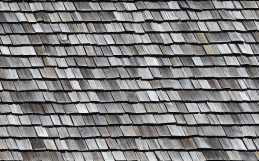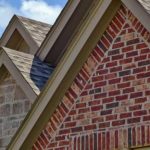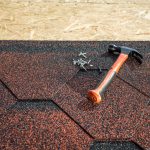Your roof is one of the most important parts of your home. It protects you and your belongings from the weather, adds to the look of your home, and can even help with energy efficiency. When thinking about types of residential roofs, it’s important to understand the different types of roofing materials available and their pros and cons.
But with so many different types of roofs and materials to choose from, selecting the right one can feel overwhelming. This guide will equip you with the knowledge to navigate the world of residential roofs. We’ll explore different roof architectures – the shapes that define your roofline – and delve into the pros and cons of popular roofing materials. By the end, you’ll be well on your way to choosing the perfect roof for your home, sweet home.
Roof Architecture
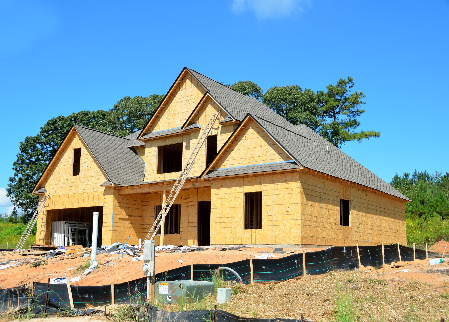 The shape of your roof can play a role not only in aesthetics but also in functionality. Here are some common roof architectures to consider. The roof style won’t influence the type of roofing material you choose, although you wouldn’t use cedar shake or clay tiles on a flat roof.
The shape of your roof can play a role not only in aesthetics but also in functionality. Here are some common roof architectures to consider. The roof style won’t influence the type of roofing material you choose, although you wouldn’t use cedar shake or clay tiles on a flat roof.
- Gable Roof: The most recognizable roof style, featuring two sloping sides that meet at a ridge. This classic design offers excellent drainage and works well in various climates.
- Hip Roof: This roof has four sloping sides that meet at a peak, offering a pyramid-like appearance. It provides good wind resistance and is ideal for areas with high winds or heavy snowfall.
- Gambrel Roof: Similar to a gable roof, but with a steeper lower slope and a gentler upper slope. This design offers additional attic space and is a popular choice for colonial-style homes.
- Mansard Roof: A distinctive roof with four sloping sides, with the lower slopes being steeper than the upper ones. It creates a formal and elegant look, but can be more expensive to build.
- Flat Roof: As the name suggests, this roof has a minimal slope (less than 10 degrees). Flat roofs are common in modern architecture and can be used for rooftop patios or gardens, but require proper drainage systems.
Types of Roofing Materials
There are many types of roofing materials to choose from for almost any type of roofing architecture you have. Some are best for sloped roofs, while others are great for flat roofs. Here’s a quick snapshot of the most common materials and their pros and cons.
Composite or Architectural Asphalt Roof Shingles
Composite asphalt shingles are the most common type of roofing material. They are made of a fiberglass base covered with asphalt and mineral granules.
Pros:
Average cost is lower than other materials
Easy to install and repair
Available in many colors and styles
Good for many types of weather conditions
Cons:
Not as durable as some other materials
Typically lasts about 20-30 years
Wood Shingles and Shakes
Wood shingles and shakes are made from cedar, redwood, or other types of wood. Shingles are machine-cut for a smooth look, while shakes are hand-cut and look more rustic.
Pros:
Natural and beautiful appearance
Good insulation properties
Can last up to 30 years with proper maintenance
Cons:
Expensive
Requires regular maintenance
Not fire-resistant unless treated
Slate Roofing
Slate roofing is made from natural stone and is known for its beauty and durability. But it’s also one of the heaviest materials to put on your home, which means you’ll need to make sure the structure can handle the weight.
Pros:
Extremely durable, can last well over 50 years
Fire-resistant
Low maintenance
Cons:
Very expensive
Heavy, may require extra support
Can be fragile and break if walked on
 Clay and Concrete Tile
Clay and Concrete Tile
Clay and concrete tiles are popular in warmer climates and offer a distinctive look. But like slate, they can also be quite heavy depending on which style you opt for.
Pros:
Long-lasting, often over 50 years
Fire-resistant
Good for hot weather
Cons:
Heavy, may need extra roof support
Expensive
Can be brittle and break under weight
Metal Roofing
Metal roofing is made from materials like aluminum, steel, and copper and is the lightest material on the list. They come in a variety of colors and styles and are often used with other roofing materials to create a striking visual.
Pros:
Durable, can last up to 50 years and beyond
Lightweight
Fire-resistant
Reflects heat, which can reduce cooling costs
Cons:
Higher upfront cost
Rubber Roof
Rubber roofing, also known as membrane roofing, is primarily used for flat roofs.
Pros:
Flexible and durable
Good for flat roofs
Resistant to water and leaks
Cons:
Can be expensive
Not as attractive as other options
Green Roofing
Green roofing involves growing plants on your roof.
Pros:
Environmentally friendly
Provides insulation
Can reduce rainwater runoff
Cons:
Requires a lot of maintenance
Needs a specific–and strong–roof structure
Can be expensive to install
Roof Tiles
Roof tiles can be made from clay, concrete, or other materials and come in various shapes and sizes.
Pros:
Durable and long-lasting
Fire-resistant
Available in many styles
Cons:
Heavy, may need extra support
Can be expensive
Installation can be complex
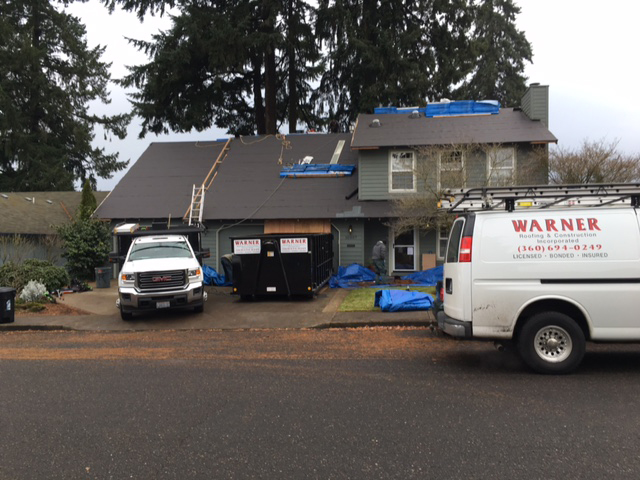 Choosing the Right Roof
Choosing the Right Roof
Unless you’re building from the ground up, or plan on a complete remodel, you will work on with the roof you have. The only real decision you have is the kind of roofing materials you’ll go with. There’s no one-size-fits-all answer to choosing a roof–the ideal material for your home will depend on your:
- Budget: Asphalt shingles are the most affordable option, while slate roofs come with a hefty price tag. If you’re considering solar panels, that will be an additional cost.
- Climate: Metal roofs are a good choice for areas with high winds or heavy snowfall, while asphalt shingles might not fare as well. Clay and concrete tiles can be susceptible to cracking in extreme temperatures.
- Style: Consider the architectural style of your home and choose a roof material that complements it.
- Local Building Codes: Some areas might have restrictions on roof materials or styles. Some HOAs may also have a say in what you can and can’t have on your roof.
Other considerations include what kind of home you are replacing the roof for. For example, metal roofing is a great product, but can be expensive, so you may think twice about putting it on an 800-square-foot rental property. On the other hand, a metal roofing profile that looks like cedar shake could well be worth the money on a grand estate.
FAQs: Your Roofing Questions Answered
How long will my roof last?
The lifespan of your roof depends on the material used, installation quality, and maintenance. Asphalt shingles typically last 15-30 years, while metal roofs can last 40-70 years or even longer. Concrete and clay tiles can last 50-100 years, and slate roofs can last for centuries with proper care.
Should I replace my entire roof or just repair it?
If the damage to your roof is minor, a repair might be sufficient. However, if your roof is nearing the end of its lifespan, has extensive damage, or leaks frequently, a full roof replacement is likely the best course of action. Consulting a professional roofer can help you determine the best course of action for your specific situation.
What factors should I consider when hiring a roofer?
Look for a licensed and insured roofing contractor with a good reputation and experience working with your chosen roof material. Get multiple estimates and ask about warranties offered on materials and labor. Don’t be afraid to ask questions and ensure you feel comfortable with the roofer’s communication and expertise.
How can I maintain my roof?
Regular inspections are crucial for identifying and addressing minor problems before they become major issues. You can perform a visual inspection of your roof yourself twice a year, looking for missing or damaged shingles, loose flashing, or signs of leaks. It’s also recommended to have a professional roofer perform a more thorough inspection every 2-3 years. Regular cleaning to remove debris like moss, leaves, and other debris can also help extend the lifespan of your roof.
What are some signs that I need a new roof?
There are several signs that might indicate your roof needs replacing, including:
- Missing or damaged shingles
- Curled or cracked shingles
- Visible signs of leaks or water damage in your attic or ceiling
- Moss or algae growth on your roof
- Sagging or buckling roof deck
- Granules accumulating in your gutters (indicating asphalt shingle wear)
Ready to Crown Your Castle with the Perfect Roof?
Choosing the right roof is an important decision for any homeowner. By understanding the different roof architectures and materials available, you can make an informed choice that fits your needs and budget. But no matter what type of roofing material you choose, proper installation is crucial–incorrect installation can lead to leaks, reduced lifespan, and other problems.
Hiring experienced roofing professionals ensures that your roof is installed correctly and will last for many years. At Warner Roofing, we have the expertise and experience to install any type of roof properly, ensuring your home is protected. We are committed to helping homeowners find the perfect roof for their homes.
Our team of experienced and certified roofers can guide you through the entire process, from selecting the right materials to expert installation. We’ll answer your questions, assess your roof’s condition, and provide a detailed proposal tailored to your specific needs. Let us help you ensure your home is protected for years to come.
Remember, a well-maintained roof is an investment in your home’s value, comfort, and peace of mind. Don’t wait until you have a major leak to address your roof’s needs. If you’re looking for a reliable roofing company in Vancouver, WA, look no further than Warner Roofing and Construction.
Whether you need a roof replacement, repair, or new installation, our team is here to help. We offer a wide range of roofing materials and services to meet your needs. Contact us today to schedule a free estimate and learn more about how we can help with your roofing project.


